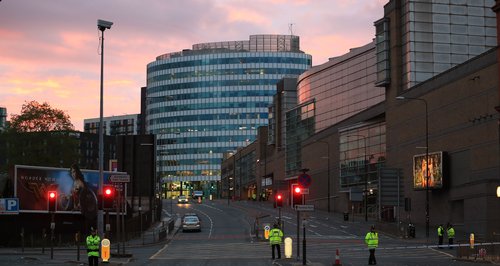MI5 missed chances to stop Arena bomber
22 November 2018, 12:13 | Updated: 22 November 2018, 12:15

Opportunities to stop the Manchester bombing were missed as a result of a catalogue failings by security services, a major new report has concluded.
A number of shortcomings in the handling of Salman Abedi before he launched a suicide attack at a pop concert in May last year, killing 22 people, were detailed by Parliament's Intelligence and Security Committee (ISC).
Abedi, 22, first came to the attention of MI5 in December 2010 and was briefly investigated by the agency in 2014.
The ISC assessment said:
- Abedi visited an extremist contact in prison on more than one occasion but no follow-up action was taken by either MI5 or police;
- MI5 decided not to place travel monitoring or restrictions on Abedi, meaning he was allowed to return undetected to the UK in the days before he carried out the attack;
- MI5 systems moved too slowly after Abedi's case had been flagged for review;
- Abedi was not at any point considered for a referral to the Prevent anti-terror scheme.
ISC chairman Dominic Grieve said: "What we can say is that there were a number of failures in the handling of Salman Abedi's case and while it is impossible to say whether these would have prevented the devastating attack, we have concluded that, as a result of the failings, potential opportunities to prevent it were missed."
He noted that both MI5 and counter-terror police have been "thorough in their desire to learn from past mistakes", adding: "The lessons from last year's tragic events must now result in real action."
The ISC, which has access to top-level security officials and classified material, reviewed the five attacks that hit Britain last year.
In total 36 innocent people were killed. In addition to the Manchester fatalities, five victims died in the Westminster attack in March, eight at London Bridge in June, and one at Finsbury Park in the same month.
Then in September, a bomb partially exploded on a tube train at Parsons Green, injuring 51 people.
The events last year prompted intense scrutiny of Britain's counter-terrorism apparatus after it emerged that in a number of cases, the perpetrators had previously appeared on the radar of agencies.
The committee said there appeared to have been "fundamental failings" in the way police and the Home Office handled Parsons Green attacker Ahmed Hassan.
But Mr Grieve said the case was not fully examined in the assessment because the Home Office failed to provide full evidence in time despite multiple requests.
The report also found that the system for regulating and reporting purchases of ingredients used to make explosives was "hopelessly out of date", and called on the business community to exert pressure on communications firms to stop their sites being used as a "safe haven" for terrorists.






